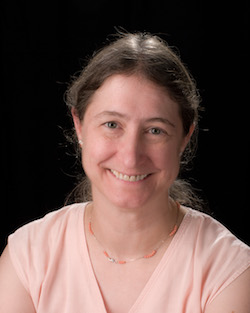Laurie Elizabeth McNeil is the 2025 John David Jackson Excellence in Graduate Physics Education Recipient
Laurie E. McNeil Named as the 2025 John David Jackson Excellence in Graduate Physics Education Recipient
The American Association of Physics Teachers (AAPT) has announced that the John David Jackson Excellence in Graduate Physics Education Award for 2025 will be awarded to Laurie Elizabeth McNeil, Bernard Gray Distinguished Professor, Department of Physics and Astronomy, University of North Carolina at Chapel Hill (UNC).
This prestigious award will be presented to McNeil during the 2025 AAPT Winter Meeting. McNeil was selected to receive the Jackson Award in recognition of her contributions to graduate education in Physics and Astronomy and related fields. She is a pioneer in graduate physics & astronomy education.
Regarding her selection to receive this award, McNeil said, “I am deeply honored to receive this recognition of my efforts on behalf of graduate education. I have been privileged to be in a position throughout my career to work to enhance education in physics and related fields at all levels, to help all students succeed in applying their talents and training in whatever area they choose.”
Throughout her distinguished career, McNeil has been a visible, ardent, knowledgeable, and successful advocate and practitioner for innovative and effective graduate physics education at Carolina and beyond. She has maintained her passion, energy, and excellence in graduate education, particularly through her leadership roles as Department Chair (2004-2009) and Director of Career and Professional Development (2022-present) for the Department of Physics and Astronomy at UNC-Chapel Hill, and Director of Graduate Studies (1995-1998) and Interim Chair (2007-2008) for the Curriculum of Applied and Materials Sciences (now Department of Applied Physical Sciences), all the while setting a very high standard in effective mentoring of PhD students, maintaining an active research program, improving diversity in the physics community (especially through her major role in the Climate for Women Site Visit Program of the American Physical Society), and championing excellence in undergraduate curriculum and pedagogy. She is recognized nationally and internationally for her work and has helped the University of North Carolina’s physics department and the University to be a leader in physics education.
McNeil is well-known on the Carolina campus and beyond for her leading efforts to develop a new general education curriculum for all undergraduates at UNC in the early 2000s (the “Making Connections” curriculum), and for transforming and modernizing her department’s physics undergraduate curriculum by introducing research-based reforms to enhance student engagement starting in the mid-2000s, which resulted in the department receiving the 2020 APS Award for Improving Undergraduate Physics Education. Perhaps less known but no less significant is her effort to develop and successfully launch the Materials Science PhD program at UNC in the mid-1990s.
Serving as the Director of Graduate Studies (DGS) for the Curriculum in Applied and Materials Sciences, McNeil worked with faculty from partnering programs, including Physics, Chemistry, Applied Math, and Dentistry, to design the graduate curriculum and get it approved by the UNC system. She was responsible for the initial launch and implementation of the program. She also developed core courses for the program and taught them for many years. In addition to the core courses, she wrote and administered the program’s doctoral written exams. Thanks to her leadership, the materials science graduate program has grown over the years and become prominent nationally and internationally, now an essential part of the recently established Department of Applied Physical Sciences at UNC.
Within the graduate program of Physics and Astronomy McNeil’s contributions have been exemplary. She has mentored and graduated a steady stream of students and sent them out well prepared into academia, national labs, and industry, or to become entrepreneurs.
McNeil has quietly gone about addressing problems wherever she saw them. A recent example is her work advocating for graduate students during the COVID pandemic, when she wrote to Congress to point out changes that were needed so that international students would not face deportation due to their inability to enroll in in-person classes. For this and other advocacy actions, she was recognized with the APS’s Five Sigma Physicist award in 2021.
She has held leadership positions in a variety of organizations that serve physics education, including serving as a member of the Board of Directors of APS (2021-2024), chairing the APS Forum on Education in 2019, and chairing the national advisory board of the Faculty Teaching Institute (formerly the New Faculty Workshop) from 2021 through the present.
About the Award
Named in honor of outstanding physicist and teacher, John David Jackson, this award recognizes physicists and physics educators who, like John David Jackson, have made outstanding contributions to curriculum development, mentorship, or classroom teaching in graduate physics education. This award recognizes that great teaching CAN be done and should be expected of great scientists at leading institutions, not only from people whose primary or entire focus is on teaching. Previous winners of this award are Mehran Kardar, David Pines, Kip Thorne, and Eugene Commins. Additional information about the award is available at http://www.aapt.org/Programs/awards/jackson.cfm.
About AAPT
AAPT is an international organization for physics educators, physicists, and industrial scientists—with members worldwide. Dedicated to enhancing the understanding and appreciation of physics through teaching, AAPT provides awards, publications, and programs that encourage practical application of physics principles, support continuing professional development, and reward excellence in physics education. AAPT was founded in 1930 and is headquartered in the American Center for Physics in College Park, Maryland.
Contact
David Wolfe
Director of Communications
- dwolfe@aapt.org
- (301) 209-3322
- (301) 209-0845 (Fax)
- https://www.aapt.org
More News
- April 10, 2025 - 2025 Richtmyer Awardee is Nadya Mason
- April 9, 2025 - Summer 2025 Fellow, Manjula Sharma, Announced
- April 4, 2025 - Bree Barnett Dreyfuss 2025 Zitzewitz Award
- March 27, 2025 - Sean Carroll to Receive 2025 Klopsteg Award
- March 12, 2025 - 2024 Lotze Scholarships Announced


